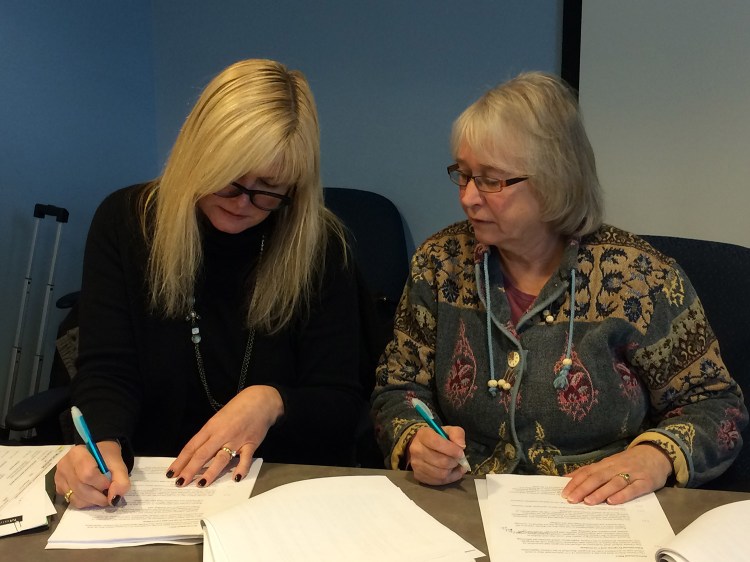AUGUSTA — The Maine Charter School Commission gave final approval Tuesday to Maine Virtual Academy to open in the fall, making it the second virtual charter school in the state.
“Congratulations. You are on your way,” commission Chairwoman Shelley Reed told board members who were at the commission meeting in the State House.
“We are thrilled,” said Amy Carlisle, chairwoman of the school’s board.
The contract was approved 4-0, with three board members not present for the vote.
The state’s first virtual charter school, Maine Connections Academy, opened in the fall.
students often non-traditional
Virtual charter school students learn largely from home and get lessons online, with limited face-to-face interaction with teachers and administrators.
Supporters say the schools are good for students who may not fit in at traditional schools, from athletes doing intense training to students who have been bullied.
Virtual charter schools also have drawn criticism, in part because local school boards outsource their management to for-profit companies that are beholden to shareholders.
Maine Virtual Academy plans to contract with K12 Inc. of Herndon, Virginia, the nation’s largest online education company, for academic services.
The school expects to open with about 300 students in grades 7-12 and expand in future years.
Carlisle said the school will have an office for administrative staff in Hampden or the Augusta area, and teachers will work from the office.
She said the board hasn’t hired personnel yet but has resumes for applicants for the head of school.
local presence stressed
“We are really excited to be moving beyond the process of applying,” Carlisle said. “Our focus now is creating that (school) community.”
The school’s backers have applied twice before.
They withdrew their application once and were rejected by the commission last spring, largely over concerns that the board did not have enough independence and oversight of the school.
That prompted board members to change key functions, including having the board hire and employ all staff, maintaining a physical location in Maine, increasing teacher pay and ensuring that teachers, administrators and staff will live and work in Maine.
“What we’ve learned is that the commission is treading very carefully,” Carlisle said, referring to the three years Maine Virtual Academy has been trying to get approved. “They really wanted to do their due diligence.”
The changes mean K12 Inc.’s agreement with the school in Maine is “a different flavor” than those the company has with virtual charter schools in other states, Carlisle said.
“The charter commission has given us strong mandates,” she said.
Reed voted against the application last spring, and again in the fall.
But she said she changed her vote Tuesday because she believes the board is more engaged, the changes make the school stronger and the contract reflects the commission’s concerns.
But she still sounded a cautious note.
“I think we are just going to have to make sure we are doing a superb job of monitoring,” she said.
“As the authorizing agency, we just have to stay with it every step of the way.”
The commission does regular site visits and reviews of charter school operations, finances and student performance.
Nationwide, 2.1 million students were enrolled in charter schools in 2011-12 – the latest school year for which figures were available – and 5.6 percent of public schools were charters, according to the U.S. Department of Education.
Maine charter schools are publicly funded but operate independently of public school districts.
Three spots remain open for new charter schools under Maine’s 10-school cap through 2021.
The six existing charter schools are Maine Academy of Natural Sciences in Fairfield; Cornville Regional Charter School; Baxter Academy of Technology and Science in Portland; Fiddlehead School for Arts & Sciences in Gray; Harpswell Coastal Academy; and the virtual charter school, Maine Connections Academy.
Maine Connections Academy contracts its services from Connections Academy, a division of Maryland-based Connections Education, a for-profit company that manages virtual charter schools in more than 20 states.
The company is owned by Pearson PLC in London, a multinational corporation that formulates standardized tests and publishes textbooks for many schools in the U.S.
A 2012 Maine Sunday Telegram investigation of K12 and Connections Education showed that Maine’s digital education policies were being shaped in ways that benefited the two companies, that the companies recruited board members in the state, and that their schools in other states had fared poorly in analyses of student achievement.
In 2013, K12 settled a federal class-action lawsuit in which some claims, including those alleging K12 made false statements about student results, were dismissed for lack of merit, while other allegations – that K12 boosted enrollment and revenues through “deceptive recruiting” practices – were dismissed after K12 agreed to pay $6.75 million to shareholders.
Noel K. Gallagher can be contacted at 791-6387 or at:
Send questions/comments to the editors.




Comments are no longer available on this story